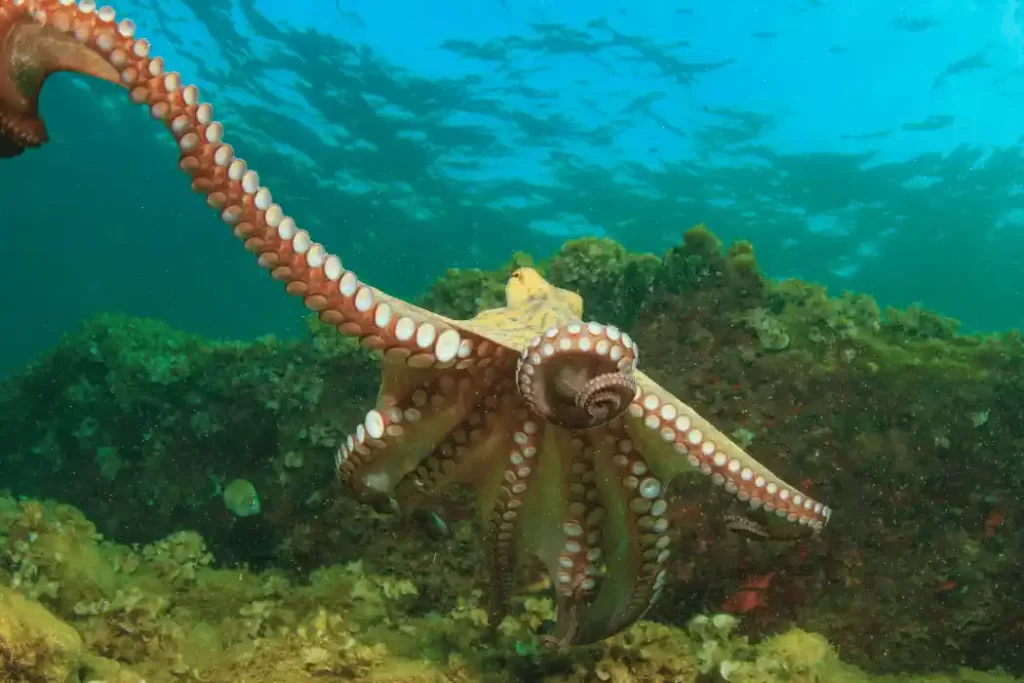Are you curious about the dietary habits of one of the ocean’s most intriguing creatures? In this blog post, we will delve into the captivating world of octopuses and explore the question, What do octopus eat? These fascinating creatures have an incredibly diverse diet that includes small marine invertebrates, crustaceans, fish, mollusks, and even other octopuses. Join us as we unravel the mysteries of octopus feeding habits and discover the extraordinary range of foods that fuel their remarkable lives. Let’s dive in and explore the captivating diet of these intelligent and enigmatic beings.
Octopuses are intriguing creatures found in oceans around the world. With their highly flexible bodies, camouflage abilities, and problem-solving skills, they have captured the fascination of scientists and nature enthusiasts alike. Exploring the diet of octopuses provides a valuable source of knowledge, shedding light on the fascinating array of foods that sustain these captivating creatures. Understanding their dietary preferences and feeding habits is crucial to unraveling the mysteries surrounding these intelligent marine animals.
An Overview of Octopuses
Octopuses belong to the cephalopod family, which also includes squids and cuttlefish. They possess a soft body, typically with a bulbous head and eight arms, lined with suction cups. These arms are highly dexterous, enabling them to catch and manipulate their prey with remarkable precision.
What Do Octopus Eat?
Octopuses are opportunistic feeders, meaning they adapt their diet based on availability and opportunity. Let’s explore some of the common food sources for these cephalopods.
Small Marine Invertebrates
Small marine invertebrates, such as crabs, shrimp, and amphipods, form a significant part of an octopus’s diet. These creatures provide a readily available source of nutrition and are often easily caught due to their slower movements.
Crustaceans
Octopuses have a particular fondness for crustaceans. Their diet may include crabs, lobsters, and crayfish. The octopus’s powerful beak allows it to break through the hard exoskeletons of these creatures, gaining access to the nutrient-rich flesh inside.
Fish
Fish are another staple in the octopus’s diet. Depending on the species and size of the octopus, they may consume small fish like anchovies and herring or larger species like flounder and even sharks. The octopus’s agility and speed in water enable it to chase and capture fish effectively.
Mollusks and Bivalves
Octopuses also have a taste for mollusks and bivalves. These include clams, mussels, and scallops. With their powerful arms, an octopus can pry open the shells of these creatures, exposing the soft flesh within.
Other Octopuses
Cannibalism is not uncommon among octopuses. Larger individuals have been known to prey upon smaller ones, especially during times when food resources are scarce. This behavior ensures the survival of the fittest and contributes to the natural balance within the octopus population.

Hunting Techniques of Octopuses
Octopuses employ various hunting techniques to capture their prey successfully. Their ability to change color and texture allows them to blend seamlessly with their surroundings, making them highly effective ambush predators. Once they spot their target, they pounce swiftly, using their powerful arms and beak to subdue and consume their prey.
Octopus Feeding Behavior
Octopuses exhibit fascinating feeding behavior. They are known to demonstrate problem-solving skills and can manipulate objects to access their food. Some octopuses have even been observed opening jars or unscrewing lids to reach their desired meal. This adaptive behavior showcases their intelligence and resourcefulness.
The Importance of Diet for Octopuses
A well-rounded diet is crucial for the health and survival of octopuses. It provides them with essential nutrients, including proteins, vitamins, and minerals, necessary for growth, reproduction, and maintaining overall vitality. A balanced diet ensures that octopuses can lead active and healthy lives.
Environmental Impact of Octopus Feeding
Octopuses, as apex predators, play a vital role in maintaining the ecological balance within their marine habitats. By controlling the population of their prey species, they help prevent imbalances that could otherwise disrupt the delicate ecosystems they inhabit.
Conservation Concerns
While octopuses are fascinating creatures, they face various threats, including habitat loss, pollution, and overfishing. It is essential for us to recognize the value of these marine animals and work towards their conservation. Sustainable fishing practices and protected marine areas are critical for the long-term survival of octopus populations.
Conclusion
the exploration of what octopuses eat reveals the incredible adaptability and intelligence of these fascinating creatures. From small marine invertebrates to fish and even other octopuses, their diet is diverse and ever-changing. Octopuses employ ingenious hunting techniques and demonstrate problem-solving skills to obtain their meals. Understanding their dietary preferences not only deepens our appreciation for their unique abilities but also highlights the importance of preserving their habitats and maintaining a balanced marine ecosystem. So the next time you wonder, What do octopus eat? remember the vast array of delicacies that sustain these captivating beings beneath the waves.


